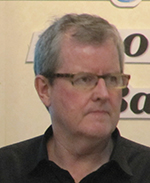A humanitarian in the front line
 |
International protection of people displaced by ISIS in Dohuk, Kurdish Region of IraqThursday 9 April 2015
|
With Paul White, UN Senior Protection Officer
Podcast available HERE (22MB mp3 format)
Slides available HERE (1MB pdf format)
Between June to December 2014 over 90,000 families, with over 500,000 individuals were internally displaced in Iraq and seeking refuge in Dohuk, a small city in the Kurdish Region of Iraq. Syrian refugees also continued to arrive in Dohuk and added to the 200,000 refugees already living there. During this time, Paul White was deployed to UNHCR – the UN’s refugee agency. Paul has recently returned from this deployment.
Paul spent 6 months in Baghdad until evacuated and then 6 months in Dohuk, near the border with Syria and Turkey. His objective in Baghdad was to try to find durable solutions for the 950,000 Iraqis registered by the Iraqi government who were displaced in 2002 and 2006/7. During this time circumstances changed and a crisis was unfolding. He was requested to lead the UNHCR protection team in Dohuk and coordinate the UN’s protection response. Many of the displaced are Christians from and around Mosul and Yazidis from the Sinjar area and Nineveh plains where ISIS has massacred minorities in a religious–cleansing campaign. Arabs and Kurds – both Sunni and Shia – were also displaced.
Paul will be speaking at The Bob Hawke Prime Ministerial Centre on Thursday 9 April about events from mid-2014, when ISIS took over Mosul and later Sinjar. He will examine some of the complexities in relation to how the UN fulfils its international protection responsibilities to internally displaced people through the provision of cash and material assistance, what networks can support families with missing relatives, assisting victims of rape and other atrocities committed by ISIS, and camps, housing, food, health and education.
Paul will describe his experiences and explain the UN structures and relationships in Iraq. He will touch on why the humanitarian system is having difficulty coping and adequately responding to emergency situations today. UNHCR has recently reduced expenditure globally by 7% and this may indicate that the global humanitarian industry is not in good shape. The need for political solutions is necessary in today’s climate with increasing on-going humanitarian crises.
Paul White is an Adelaide lawyer who has worked, since August 2006, with various UN agencies (UNHCR, UNICEF, WFP, UN OHCHR) through the UN interagency Protection Project (PROCAP). The project which has support from a wide variety of donors including Australia, USAid, DFID, Canada and several European countries, is administered by the Norwegian Refugee Council.
Photographs courtesy of UNHCR.
Paul White
 Paul White is an Australian lawyer who has worked since August 2006 with various UN agencies (UNHCR, UNICEF, WFP, OHCHR) through the UN interagency Protection Project (PROCAP). The project which has support from a wide variety of donors including Australia, USAid, DFID, Canada and several European countries, is administered by the Norwegian Refugee Council. The PROCAP Steering Committee is based in Geneva and has members from UNICEF, UNHCR, OHCHR, and a secretariat provided by the Office of the Humanitarian Coordinator (UN OCHA). PROCAP deployments are for a maximum of one year. Senior Protection Officers are assigned to work with UN agencies to build capacity and to provide strategic advice.
Paul White is an Australian lawyer who has worked since August 2006 with various UN agencies (UNHCR, UNICEF, WFP, OHCHR) through the UN interagency Protection Project (PROCAP). The project which has support from a wide variety of donors including Australia, USAid, DFID, Canada and several European countries, is administered by the Norwegian Refugee Council. The PROCAP Steering Committee is based in Geneva and has members from UNICEF, UNHCR, OHCHR, and a secretariat provided by the Office of the Humanitarian Coordinator (UN OCHA). PROCAP deployments are for a maximum of one year. Senior Protection Officers are assigned to work with UN agencies to build capacity and to provide strategic advice.
Paul has recently returned from a deployment with UNHCR in Iraq, where he spent 6 months in Baghdad until he was evacuated and 6 months in Dohuk, in the Kurdish Region of Iraq near the border with Syrian and Turkey. His objective in Baghdad was to try to find durable solutions for the 950,000 Iraqis registered by the Iraqi government who were displaced in 2002 and 2006/7. While working on this objective circumstances changed and he was requested to lead the protection team of about 30 less senior protection people in Dohuk, where a crisis was unfolding. Over 500,000 internally displaced people (IDPs) arrived in Dohuk from Mosul and Sinjar. Syrian refugees also continued to arrive in Dohuk and added to the 200,000 already living there.
Paul has previously been deployed to South Sudan (WFP), Myanmar (UNHCR), Nepal (UNHCR), Uganda (UN OHCHR) and Sudan (UNICEF). As a PROCAP he has also worked in a regional role in Bangkok and at global level based in Rome with WFP. Amongst other things he has worked on a variety of issues including FGM, Statelessness, durable solutions, protection in food security and established or led Protection Working Groups and Protection Clusters in several places.

Presented by The Bob Hawke Prime Ministerial Centre
While the views presented by speakers within the Hawke Centre public program are their own and are not necessarily those of either the University of South Australia or The Hawke Centre, they are presented in the interest of open debate and discussion in the community and reflect our themes of: strengthening our democracy - valuing our diversity - and building our future.
The copying and reproduction of any transcripts within the Hawke Centre public program is strictly forbidden without prior arrangements.


